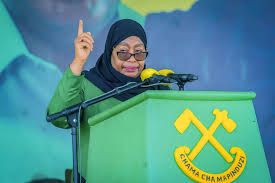
Daniel Otera
Tanzania’s political landscape remains turbulent as President Samia Suluhu Hassan claims a landslide victory, securing 98% of the vote in the country’s recent election. However, this announcement has been met with widespread dissent and protests, leading to claims of gross electoral misconduct and reports of severe violence across the nation.
Opposition party Chadema, which was barred from participating in the election, has rejected the results, labelling them a “sham” and calling for immediate new elections. Chadema has also voiced its concerns over the rising death toll, with the party estimating at least 800 casualties, though these figures have not been independently confirmed. Human rights groups report even higher numbers, with some sources suggesting that hundreds, possibly thousands, of deaths have occurred since the protests erupted on election day.
The election was marred by violent clashes, and Tanzania’s streets have remained largely empty since the protests. State television announced that Hassan’s inauguration, scheduled for Monday, will take place without the usual public ceremony. The event, which was supposed to be a grand display at a stadium, will now be held at the State House in the capital, Dodoma. This change reflects the tense atmosphere as protests against Hassan’s government continue, and the internet remains cut off, further isolating the country from global scrutiny.
The internet blackout, enforced following the protests, has raised concerns that authorities may be using the blackout as a tool to track down opposition members and protesters who may possess evidence of government violence. In Zanzibar, a region known for its relative political freedom, masked armed men have been spotted patrolling the streets without clear identification.
Tanzania’s security forces have reportedly been stopping and questioning people, searching for potential evidence of the unrest. In Dar es Salaam, the nation’s largest city, a near-total lockdown has been implemented, with authorities controlling movement and limiting access to essential services.
The violence that has plagued the country is drawing international attention. UN Secretary-General António Guterres expressed deep concern over the deaths and injuries caused by the protests. Meanwhile, Pope Leo XIV called for prayers for the victims of the violence, urging Tanzanians to pursue dialogue and avoid further bloodshed.
President Hassan, who rose to power following the sudden death of her predecessor, John Magufuli, in 2021, had sought a decisive electoral victory to cement her leadership and silence critics within her ruling party. However, human rights groups have accused her of overseeing a “wave of terror” in the lead-up to the election. Abductions and intimidation tactics were reportedly used to suppress opposition voices and stifle dissent.
Despite these challenges, the Electoral Commission reported a voter turnout of 87%, although observers and AFP journalists noted that polling stations were eerily empty before the violence erupted. This has only added to suspicions about the legitimacy of the election results.
